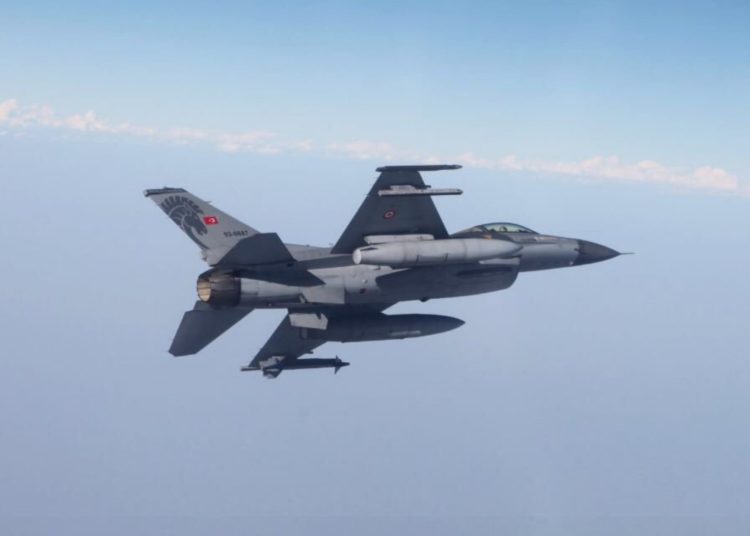Abdullah Bozkurt
The first-ever airstrike carried by the Turkish Air Force on the Islamic State in Iraq and Syria (ISIS) in 2015, viewed as a major shift in Turkey’s position on the terrorist group in Syria, was nothing but a smokescreen to cover up Turkey’s real aims, new evidence suggested.
According to court testimony under oath by Capt. Uğur Uzunoğlu, the attack on ISIS targets in Syria on July 24, 2015 was a distraction and a prelude to a series of airstrikes on the Kurdistan Workers’ Party (PKK) in Iraq’s north, its first such attack on the Kurdish separatist group after a more than two-year ceasefire.
“The day before the operation [against the PKK], a small-scale operation was carried out against ISIS targets in Syria in an attempt to mislead and hide the [main] operation. A day later the plan that had been prepared in advance against the separatist terrorist PKK was executed,” he told the Ankara 4th High Criminal Court on February 26, 2018 during a trial concerning a July 15, 2016 failed coup in Turkey.
Uzunoğlu, a veteran combat pilot with the 143rd Squadron at the 4th Main Jet Base in Ankara, was at the Diyarbakır Air Base in southeastern Turkey where the operation was launched. He was at the base as part of support for a training mission for the pilots who conducted counterterrorism operations (Terörle Mücadele Herekatı, or TMH). The base is the location of the 8th Main Jet Base Group Command, which controls the 181st Squadron and mainly comprises F-16 jets.
“Abidin Unal, commander of the air force at the time, came to Diyarbakir and personally told all the pilots in the 181st Squadron that they had a very important message from our nation to deliver, stated that it would be delivered to the relevant parties by us and that he had full confidence in us,” Uzunoğlu said of the meeting at the base. He underlined that the plan against the PKK was drawn up far in advance and that a small-scale strike on ISIS in Syria was part of the operation.
Combat pilot Capt. Uğur Uzunoğlu’s testimony revealed the misleading aspect of Turkish airstrikes on ISIS targets:
The operation had multiple problems in the planning stages, especially in coordination, such as the late transfer of jets from another base in Bandırma, where the 161st Squadron under the 6th Main Jet Base Command is located.
“We wanted the start-up time to be delayed because we saw inadequate preparations, but that was not accepted, and that’s how the operation started,” Uzunoğlu said, adding that in the end the operation dealt a major blow to the PKK.
The first operation against ISIS in Syria at the time, which reportedly hit targets in the Syrian border village of Hawar al-Nahrm, came after Turkey faced strong criticism for its reluctance to contribute to the US-led coalition to combat ISIS as well as for allegedly turning a blind eye to the transfer of foreign jihadist fighters through Turkish territory.

Then-acting Prime Minister Ahmet Davutoğlu said the bombing had removed “potential threats” to Turkey and emphasized that Turkey was determined to eliminate all terrorist threats against the country. He said the operation was not limited to one day or one region and that Turkey would not hesitate to retaliate against “the slightest threatening movement.” Turkish officials had informed NATO allies before the strikes.
Three F-16 warplanes hit two ISIL bases and one assembly point before returning, the prime minister’s office said in a statement on July 24, 2015. The warplanes took off from a base in Diyarbakır, according to the statement. The operation started at 3:12 a.m. and ended at 4:24 a.m. It resumed the next weekend, with the bombing of PKK shelters and storage facilities across the border in northern Iraq.
The Turkish airstrikes came shortly after the reluctant government of President Recep Tayyip Erdoğan finally agreed to allow the US to use air bases in southern Turkey to launch strikes against ISIS. The deal allowed the US-led coalition to be positioned on Turkish soil to conduct better surveillance over Syria and act more quickly on intelligence than when it was limited to launching flights from places like Iraq, Jordan and the Gulf States.
İncirlik Air Base, located near Turkey’s border with Syria, is a joint US-Turkish installation that houses the US Air Force’s 39th Air Base Wing. Its proximity to ISIL-controlled territory in Syria — including Raqqa, then ISIS’s de facto capital — makes it an attractive launching pad for US airstrikes against the militant group. Turkey shares a 1,250-kilometer (775-mile) border with Syria and Iraq, where ISIL controlled broad swathes of territory at the time.
The Turkish air force attack on PKK targets in Iraq appeared to be part of a secret deal between Turkey and the US and was finally authorized during a phone call between Erdoğan and President Barack Obama on July 22, 2015. Two days after the conversation, Davutoğlu acknowledged that negotiations with the US had reached a specific point and that Turkey’s concerns were being addressed.
“We respect our NATO ally Turkey’s right to self-defense against the PKK’s terrorist attacks. The PKK, which is included in US’s list of terrorist organizations, should end its terrorist activities and come into dialogue with the Turkish government,” said White House spokesman Alistair Baskey in a press statement on July 25, 2015.
Brett McGurk, the then-US deputy special presidential envoy for the Global Coalition to Counter ISIL, posted a tweet on July 26 condemning the PKK’s terrorist attacks and underlining that the US “fully respects Turkey’s right to self-defense.”
The airstrike came two days after an attack that killed two police officers in the Ceylanpınar district in the border province of Şanlıurfa, allegedly carried out by the PKK. The event marked the end of the settlement process between the government and the PKK’s imprisoned leader, Abdullah Öcalan, that began in October 2012 in a bid to resolve Turkey’s long-standing Kurdish and terrorism problems.












